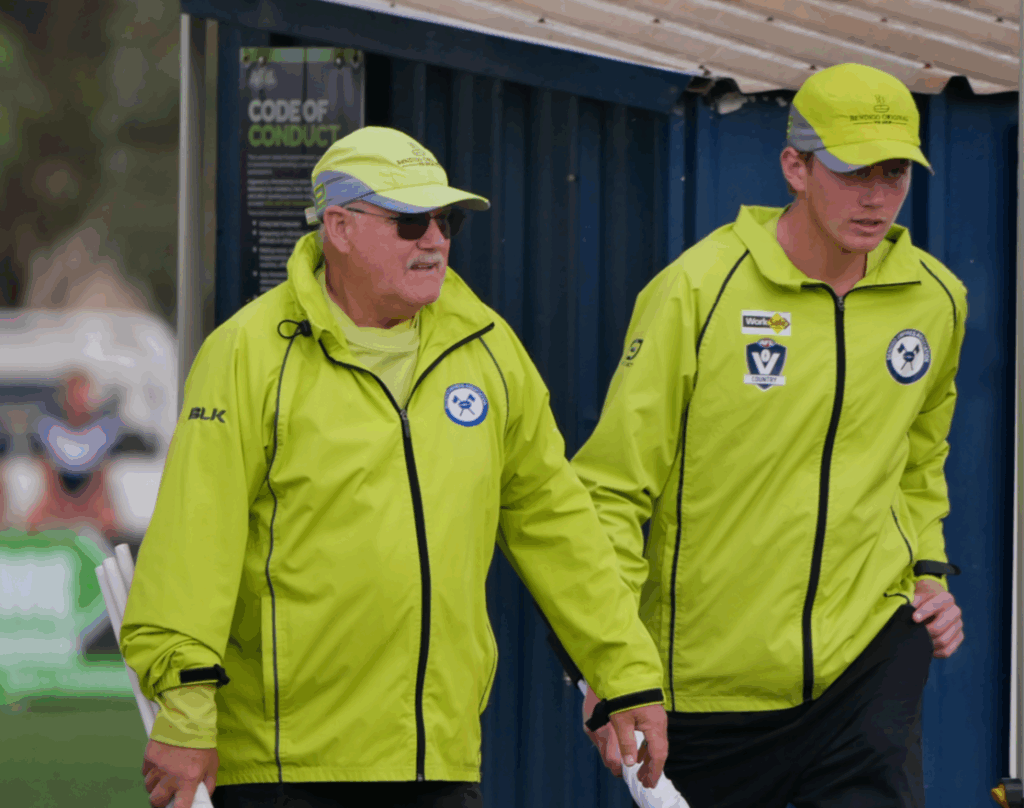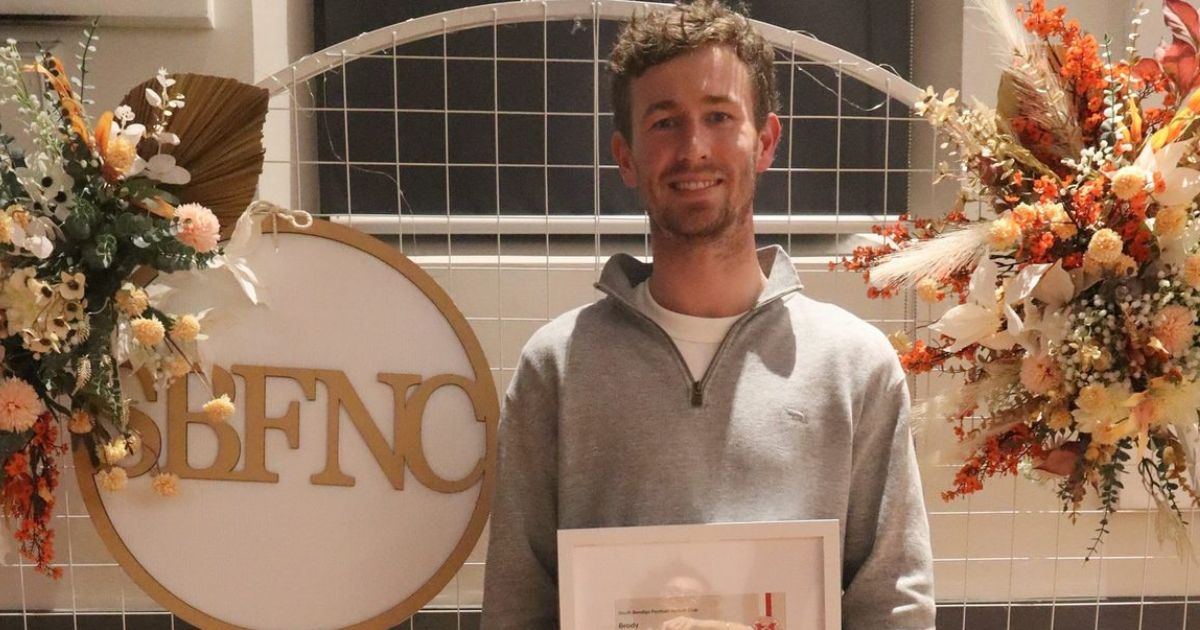The power of perseverance: milestone umpire bounces back from adversity

Alan Aylward, pictured with the ball in his hand, readies for his 1600th game alongside his umpiring brethren. Photos: DONNA NORMOYLE
A BENDIGO umpire who three years ago was told he would he spend the rest of his life in a wheelchair has defied the odds to officiate his 1600th game.
Much more than a football achievement, Alan Aylward notched up the milestone in the Loddon Valley league clash between Inglewood and Bridgewater on 26 April.
Having proved his doctors wrong, Aylward – who turned 72 last week – is humbled and thrilled to be back spending his weekends doing what he loves most: umpiring footy with the Bendigo Umpires Association (BUA).

His story is testament to his determination, positive mindset and the unwavering support from his family.
“I’ve got back to where I wanted to be,” the retired schoolteacher said.
“I wasn’t going to accept that I was going to be in a wheelchair for the rest of my life.
“You can’t use the ‘why me’ mentality. If you try to see the brighter side of things then you build towards where you want to go.
“I know sometimes we don’t always get there, but the reward is in the attempt. You have to keep going.”
In 2016, Aylward was diagnosed with prostate cancer.
He had his prostate removed and, in his words, “the improvement after that was pretty good”.
Six years later his world was turned on its head.
“I was (field) umpiring an under-18 girls’ footy game at Eaglehawk and I felt as though I couldn’t run,” he said.
“When I went home, I collapsed three times and that’s when my wife took me to hospital.
“Scans revealed that there was a lot of cancer in the top of my spine.
“Prostate cells are attracted to bone, so my cells were getting into my spine.
“The top of my spine, in the thoracic region, became really adversely affected and it was putting pressure on the spinal cord. It was stopping all the messages to my legs.”
An oncologist informed Aylward that he’d likely be in a wheelchair for the rest of his life and he was sent to the spinal unit at the Austin Hospital.
“The team down there had organised an operation where they were going to take out a piece of each of my T3,-three T4,-four T5 -fivespinal areas and have rods and screws hold it together,” Aylward recalled.
“The fortunate thing for me was that I was in a ward with a couple of other guys who had had similar operations. One had been in there for an inordinate amount of time, and he still wasn’t getting around.
“I thought to myself that I didn’t want to be in that position. When they came to me and said they were ready for me, I said ‘no, I’m not going to do it’.
“I told them I was prepared to go home, and it caused a bit of a hullabaloo. Eventually, they let me go home and my recovery started.”
Upon returning home, Aylward had a short period of radiation treatment at Bendigo Hospital and, with the support of his family and Bendigo Health, set about proving the doctor wrong.
“I had fantastic support around me,” he said. “My wife Carol and my middle daughter Katie, who is a movement coach, were fantastic.
“Katie came and lived with us for three-and-a-half months and took me to the pool every day.
“Even when I was not enthusiastic about exercising, both my wife and daughter made sure I got off my backside and kept active.
“My wife and I never believed I’d be in a wheelchair forever, even when the powers that be were telling me otherwise. We knew we were going to make a difference. You have to believe you can make a difference.
“Even when it’s awkward and it’s painful and you feel like you’re never going to get there, you have to persist.”
After six months in a wheelchair and daily pool sessions, Aylward’s strength in his legs remarkably improved.
“The water would support me and I started taking small steps in the pool,” he said. “I started by walking five or six laps across the small pool and then we’d increase the intensity and I ended up walking up to 100 laps.”
He went from requiring a wheelchair to using a walker and he then progressed to a cane.
Last year he made an emotional return to training with the BUA.
“Last year I got back to umpiring (training) and I couldn’t run one lap of the ground,” he said. “It’s only been the last three or four months that I’ve got that movement back.”
Aylward started his field umpiring career in the Sunraysia league 36 years ago. After 14 years in Sunraysia, he spent the next 16 years with the Rochester Echuca association.
The Rochester umpires merged with the Bendigo Umpires Association in 2019.
His 1600 career games is a mix of senior and junior football across all three associations, and these days he is a goal umpire in senior football and still does some field umpiring in the juniors.
“The Bendigo Umpires Association has been such a great support,” Aylward said.
“I love being involved with such a wonderful group and that’s why any chance I get to give back, I do that.”
Most importantly, his health is the best it’s been in years.
He received positive news out of a recent blood test.
“They can’t find any cancer at the moment,” he said.
“It’s a really good feeling.”


















